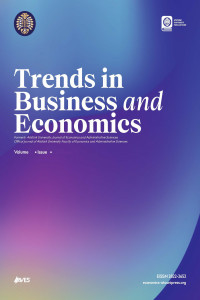Raşid Gannuşi’nin Devlet Anlayışında Şura Yaklaşımı
Gannuşi, Şûra, Ümmet, İslam Devleti, Müslüman Demokratik Devleti, Arap Baharı
The Approach of Shura in Rachid Ghannouchi’s Conception of the State
Ghannouchi, Shura, Ummah, Islamic State, Muslim Democratic State, Arab Spring,
___
- Al-Mawardi, A. A. H. (1996). Al-Ahkam as-Sultaniyyah The Laws of Islamic Governance. Trans. Asadullah Yate (London: Ta-Ha Publishers, 1996).
- Arieff, A. and Humud, C. E. (2014). Political Transition in Tunisia, Congressional Research Service, Retrieved from: www.crs.gov (last accessed; 10.10.2020)
- Bartal, S. (2020). Rached Ghannouchi’s test: Political Islam and democracy in Tunisia. African Studies, 1-15.
- Black, A. (2011). The History of Islamic Political Thought; from the prophet to the present. Edinburg: Edinburg University Press
- Constitute (2014). Tunisia’s constitution of 2014. constituteproject.org, Retrieved from: https://www.constituteproject.org/constitution/Tunisia_2014.pdf (last accessed; 10.10.2020)
- El-Ghazali, A. H. (2011). The way to the revival of Ummah A study of the thinking of Imam al Banna. Cairo; Al Falah Foundation
- Elo, S. and Kynga, S.H. (2008). The qualitative content analysis process. Journal of Advanced Nursing 62(1), 107–115
- Enayet, H. (1982). Modern Islamic Political Thought. London and Basingstoke; The Macmıllan Press Ltd
- Esposito, J. L. and Piscatori. J.P. (1991). Democratization and Islam. The Middle East Journal 45 (3), 427-440
- Ghannouchi, R. (2015). İslam Devletine Kamusal Özgürlük. Translated by- Osman Tunç, İstanbul: Maya Yayınları
- Göksel, O. (2014) Perceptions of the Turkish Model in Post-Revolutionary Tunisia, Turkish Studies, 15:3, 476-495, DOI: 10.1080/14683849.2014.954747 Hourani, A. (1983), Arabic Thought in the Liberal Age, 1798-1939, 2nd edition, Cambridge, Cambridge University Press
- Ibn Taymiyyah (2000). The Political Shariyah on Reforming the Ruler (translated by Dr Umar Farrukh)”, UK; Dar ul Fiqh
- Krippendorff, K. (2004). Content analysis: An introduction to its methodology (2nd ed). Thousand Oaks, CA: Sage.
- Lübben, I. (2016). 10th conference of the Tunisian Ennahda Party; Farewell to political Islam? Qantara.de, Retrieved from; https://en.qantara.de/content/10th-conference-of-the-tunisian-ennahda-party-farewell-to-political-islam (last accessed; 10.10.2020) McCarthy, R. (2018). Inside Tunisia's al-Nahda: between politics and preaching. Cambridge University Press.
- Middle East Eye (2016). Rached Ghannouchi Q&A: Thoughts on democratic Islam. Retrieved from: https://www.middleeasteye.net/news/rached-ghannouchi-qa-thoughts-democratic-islam (last accessed: 09.10.2020)
- Mulk, N. (1960). Siyar al-Muluk (siyasatnama), ed.Hubert Darke, New Haven: Yale University Press.
- Ounissi, S. (2016). Ennahda from within: Islamist or “Muslim Democrat”? Brookings Institution Rethinking political Islam series, March 2016 Qaradawi, Y. (2004). State in Islam, Al Falah Foundation, Cairo.
- Qutb, S. (2013). Social Justice in Islam, Translated by Mohammad Ali Gerami and Seyed Hadi Khosrowshahi. Qom: Institute of Boostane-e-Ketab (Center for Islamic Propagation Office of Qom Seminary)
- Shavit, U. (2010). Is Shura a Muslim form of democracy? Roots and systemization of a polemic. Middle Eastern Studies, 46(3), 349-374.
- Tamimi A.S. (2001). Rachid Ghannouchi; A Democrat within Islamism. New York: Oxford University Press
- Tamimi, A. S. (1997). Democracy in Islamic Political Thought. ENCOUNTERS-LEICESTER-, 3, 21-44.
- The Noble Quran (2016), Website; https://quran.com/
- Turabi, H. (1983) ‘The Islamic State’, In John Esposito (ed.) Voices of Resurgent Islam (pp. 241-51). Oxford: Oxford University Press.
- Whyte, S. A. (2019). Advancing Shūrā: A Social Agent for Democratization. Islam and Christian–Muslim Relations, 30(3), 345-362.
- Wolf, A. (2013) An Islamist ‘renaissance’? Religion and politics in post-revolutionary Tunisia, The Journal of North African Studies, 18: 4, 560-573, DOI: 10.1080/13629387.2013.829979
- Zoubir, Y. H. (1998). Democracy and Islam in Malek Bennabi’s Thought, The American Journal of Islamic Social Science 15: 1
- Başlangıç: 1977
- Yayıncı: Atatürk Üniversitesi
Raşid Gannuşi’nin Devlet Anlayışında Şura Yaklaşımı
Korku Endeksi (VIX) ile Kıymetli Madenler Arasındaki İlişki Üzerine Ekonometrik Bir Çalışma
Mert Baran TUNÇEL, Yaşar ALPTÜRK, Tayfun YILMAZ, İsmail BEKCİ
Covid-19 Salgını Sürecinin İşgücü Piyasaları Üzerine Etkisi: Uygulamalı Bir Araştırma
İlkay NOYAN YALMAN, Esra AYDIN ÜNAL, Şerife Merve KOŞAROĞLU
Annelerin Çocuk Yetiştirme Tutumlarının Çocukların Tüketim Davranışına Yansıması
Çin’in Akdeniz Politikaları Kapsamında Avrupa Birliği-Çin Stratejik Ortaklığı
Cemre PEKCAN, Ayşe Gülce UYGUN
Tüketici Güveninin Oluşumunda Borsa ve Döviz Kurunun Etkisi: OECD Ülkeleri Uygulaması
